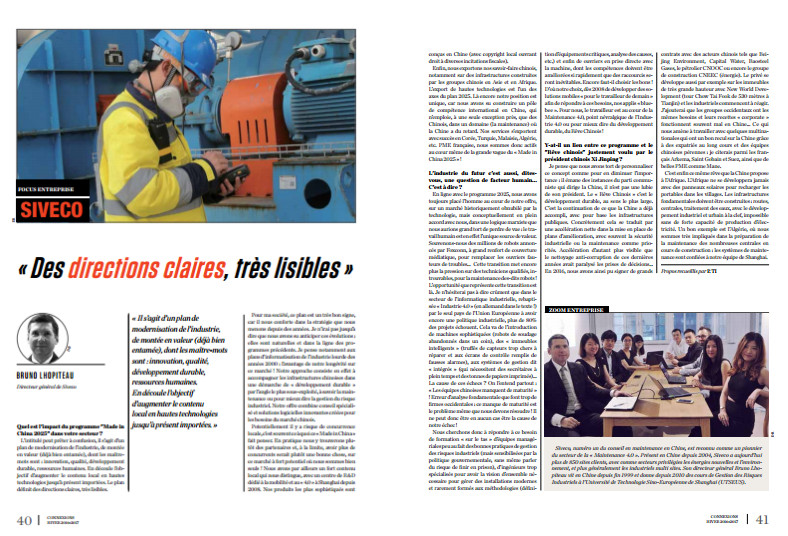“Clear and transparent directions”
Interview of Bruno Lhopiteau, General Manager of Siveco, Published in the March 2017 issue of Connexions, the magazine of the Chamber of Commerce and Industry of France in China (CCIFC)

What is the impact of the “Made in China 2025” program in your sector?
Its title may be confusing, but the program aims at modernizing the industry and moving up the value chain, a process already well under way. Key words are: innovation, quality, sustainable development, human resources. Hence the goal of increasing local content in high technologies, which until now were imported. The program gives very clear and transparent directions.
For my company, this is a good sign, as it validates the strategy we have adopted many years ago already. I would not claim we anticipated this evolution: it is natural and in line with previous programs, such as heavy industry informatization plans in the year 2000s. That’s the benefit of our longevity in the Chinese market!
Our approach consists in assisting Chinese infrastructures in their sustainable development efforts, from an angle so far underexploited, that of maintenance and more generally industrial risk management. Our offering combines specialized consulting services and innovative software solutions designed for the Chinese market.
The term “Made in China” makes one think of increasing local competition. As far as our business is concerned, it more likely means potential partners. Moreover, I would say we welcome more competitors in this high-potential market… where we sometimes feel a bit lonely! At the same time, our local content is very high, which is one of our strengths: our Shanghai R&D center, dedicated to mobility and “4.0” solutions, was setup in 2008. Our most advanced products are developed in China with local copyright (which means we also benefit from significant tax incentives).
Furthermore, we now export our Chinese know-how, most notably for infrastructures built by Chinese construction groups in Asia and Africa. The development of high-tech exports is another objective of the 2025 plan. Here again our positioning is rather unique, as we have managed to build a global center of excellence in China, employing only Chinese staff (with the exception of one expat), in a discipline (maintenance management) in which China is still lagging behind. So far, we have successfully exported our services to Korea, Turkey, Malaysia, Algeria, etc. A French SME, we are active at the very heart of the great “Made in China 2025” wave!
You say human factors are central to the “Industry of the Future”: what do you mean?
In line with the 2025 program, we have always put man at the center, in a market historically obsessed with technology, but conceptually in full agreement with us. Let me explain. It would be a mistake to ignore Marxist logic, for which human labor is the unique source of value. Do you remember the millions of robots announced by Foxconn in a media frenzy, to replace troublesome workers? This evolution puts even more demand on hard-to-find qualified technicians, to maintain those robots! Here lies our opportunity. To put it bluntly, in the field of industrial IT, recently renamed “Industrie 4.0” (in German, by the only European Union nation that still has an industrial strategy…), more than 80% of projects fail… We could take the examples of advanced machinery (welding robots left to collect dust in a corner of the factory), “intelligent” buildings (stuffed with sensors too costly to replace, their control room displays crowded with false alarms), so-called “integrated” management systems (requiring full-time data input clerks and tons of printed papers)… What causes those failures? The story we always hear is that “Chinese workers are not mature enough”! This reflects a fundamentally flawed analysis. Indeed, this relative lack of maturity is the very problem we must address, thus it cannot be cited as the cause of project failure!
Our aim is to address this challenge, the need to train, on-the-job, management teams with little experience of industrial risk management best practices (but keenly aware of it, thanks to government campaigns, not to mention the risk to end up in jail…), engineers often too specialized to have the overall perspective needed to manage modern plants and rarely trained on methodologies (identification of critical equipment, failure cause analysis, etc.) and finally the workers who operate the machines, whose skills must be upgraded so fast that shortcuts are inevitable. The challenge is to take the right shortcuts! Hence the decision we made in 2008 to develop mobile solutions “for the worker of tomorrow” to address those specific needs: our “bluebee®” apps. For us, the worker is at the heart of Maintenance 4.0, itself at the core of Industry 4.0, sustainable development and the China Dream!
What is the relationship with the « China Dream » coined by President Xi Jinping?
I believe it is wrong to personalize this concept, as if to diminish its importance: it emanates from the Chinese Communist Party that drives the nation; it isn’t a fancy of its president. The China Dream is synonymous of sustainable development in its broadest sense. It builds on what China has already achieved, with a focus on public infrastructures.
In practice, we see a notable acceleration in the implementation of industrial improvement projects, often with safety or maintenance as priorities. This trend is all the more obvious, considering that the anti-corruption campaign of the past few years had brought most decisions to a halt… As a result, during 2016, we have signed major contracts with such Chinese players as Beijing Environment, Capital Water, Baosteel Gases, oil company CNOOC and construction group CNEEC (energy). The private sector is going in the same direction, for example ultra-high buildings (contract with New World Development for the 530-meter high Chow Tai Fook tower in Tianjin), and we observe that industrial companies also start moving. I would add that multinationals have the exact same needs and that simply duplicating a global corporate approach seldom works in China… Therefore we also get to work with those multinationals that have acquired enough Chinese experience, thanks to stable expats and local teams. To name some of our French clients: large firms such as Arkema, Saint Gobain, Suez, but also brilliant SMEs such as Mane.
Finally, it is the same dream that China is proposing for Africa. Africa will not develop by installing solar panels to charge smartphones in villages. Basic infrastructures must be built: roads, power plants, water treatment facilities, to support industrial and urban development, which is not possible without large-capacity power generation. Algeria is a good example, a country where we are very involved to prepare the maintenance of many power plants currently under construction: all maintenance systems are managed by our Shanghai team.
Interview by P.Ti. for Connexions March 2017




